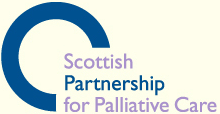- SPPC Achievements 2024-25
- Annual Conference 2025: From System Holes to Whole System
- Call for Posters
- Assisted Dying Bill - Perspectives Informed by Palliative Care
- SPPC’s response to the public consultation on the SG Strategy for Palliative Care
Poster abstracts of the month
Poster abstracts of the month
The SPPC Annual Conference in 2017 featured 46 poster displays, sharing work and research underway across Scotland. Each month, this blog focuses on the content of a few of these posters. This month, we focus on six of these:
- Enriching & Improving Experience
- Football and Absent Friends
- Hospital Based Complex Clinical Care
- Implementing Palliative and End of Life Care Standards in Scottish Prisons
- Inheritance Books and Health Promoting Palliative Care at the Edinburgh International Book Festival
- Inspiring Leadership – Leading self; leading others in a palliative care setting
Enriching & Improving Experience |
|
Authors |
Jane Andrew; Elaine Colville; Elizabeth Sanchez-Vivar |
|
A framework to support the learning and development needs of the health and social service workforce in Scotland” (2017) We took an integrated collaborative approach to identify the knowledge and skills required by all health and social service workers in palliative and end of life care. We consulted widely with health and social service workers, palliative care experts, educators and other partners in cyclical co-design approach. The structure and content was informed by evidence gathered from, scoping exercise, rapid review of literature, mapping of existing frameworks, workforce focus groups, online learning needs survey, expert and reference group opinion, workforce consultation events and online workforce consultation. Results: Five domains reflect the core knowledge and skills integral to the delivery of high quality palliative and end of life care. Each domain contains four levels of knowledge and skills. The framework promotes a person-centred, outcomes-focused, human rights-based approach. Conclusions: Integration of health and social care in Scotland means that increasingly teams from different sectors are coming together to provide care and support focussed on people’s needs. The scope and depth of workforce engagement undertaken is a strength of this framework which will support implementation across integrated services. |
|
Football and Absent Friends |
|
Author |
Jeanette Byers |
|
Health Promoting Palliative Care Project
worked in collaboration with Hibernian Football Club GameChanger Project to
host a 'To Absent Friends' event during November 2017, as part of the wider
national To Absent Friends Festival. Response from fans was overwhelmingly
positive, with over 500 personal tributes collated on posters that were
available in the stadium. This demonstrated the value of promoting openness
about bereavement in a community setting that is not routinely associated
with end of life matters. |
|
Hospital Based Complex Clinical Care |
|
Authors |
Jeanette Byers; Mairi Johnston |
|
Palliative Care Specialist Nurse and
Palliative Link nurses organised an event for ‘To Absent Friends’ (TAF) week.
On the 1st November, tables were set up in 5 hospital areas with resources
provided by Health
Promoting Palliative Care Project (leaflets, memory books, memorial trees, TAF posters, pens
etc). Each area was manned for 2 hrs in the afternoon. This allowed communication with staff,
patients and visitors so that displays could be introduced sensitively. Staff
and visitors were given the opportunity to write in the book or write tags to
hang on the tree. One ward area now offers the memorial book all year round
for patients and visitors to use. |
|
Implementing Palliative and End of Life Care Standards in Scottish Prisons |
|
Author |
Gail Allan |
|
Background:
The
Scottish Government’s Strategic Framework for Action on Palliative and End of
Life Care shares a vision where palliative and end of life care is available
to all including those in Prison. With an ageing prison population, the
Scottish Prison Service has to deal with more foreseeable deaths than ever
before. This brings new challenges for both prison regimes and prison
facilities in providing quality palliative and end of life care for those
prisoners. |
|
Inheritance Books and Health Promoting Palliative Care at the Edinburgh International Book Festival |
|
|
Authors |
Danuta Orlowska; Andrew Reeves; Brigid Lyon; Rebecca Patterson; Mark Hazelwood |
|
The Edinburgh International Book Festival
attracts audiences from around the world. This year, the Scottish Partnership
for Palliative Care, St Columba's Hospice Edinburgh and Marie Curie Hospice
Edinburgh were offered space there for a weekend. We used this in several
ways: |
|
Inspiring Leadership – Leading self; leading others in a palliative care setting |
|
|
Authors |
Jane Miller; Susan Jackson; Fiona Wylie; Claire O'Neill |
|
Background: It is recognised within Palliative Care (PC) that band 6 CNS’s, in particular newly appointed staff have reported feeling vulnerable, stressed and struggling to deliver high quality care due to organisational change and increasing complexity around their role. To address the above an NHSGGC PC Leadership Steering Group was established in partnership with NES Leadership Unit. Aims: ž Provide a pilot leadership training programme open to band 6 PC CNS’s working within NHSGGC acute and hospice care settings ž Facilitate greater successional planning ž Develop a robust evaluation programme to explore perceived impact on practice. Methods: In conjunction with NES Leadership Unit a needs led leadership programme is currently being delivered and evaluated due to complete February 2018 Interim Results: 10 CNS’s participated. Participants have attended a launch day and two masterclasses: ž Myers Briggs and Working with Differences Support a quality improvement (QI) programme individual QI action plans ž QI methodology to support the participants to undertake a work based QI project. Received ‘360’ feedback helping to inform their PDP. Participated in Action Learning Sets. Conclusion: Feedback to date has confirmed the importance of this programme in addressing a need, focusing on developing leadership skills for a capable, sustainable workforce (201). |
|


